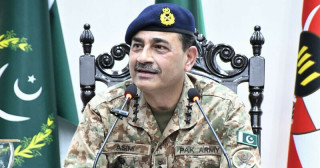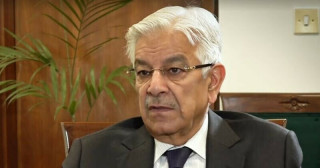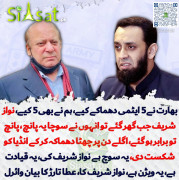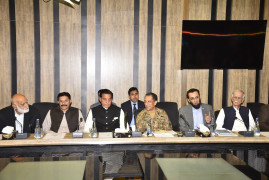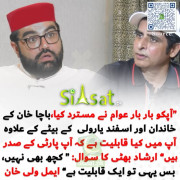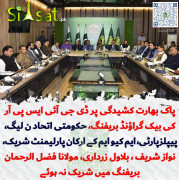Minorities are ruling India. No need to take care of them as constitution provide legal security to them.
Amnesty International Annual Report 2011 - India
Head of state: Pratibha Patil
Head of government: Manmohan Singh
Death penalty: retentionist
Population: 1,214.5 million
Life expectancy: 64.4 years
Under-5 mortality (m/f): 77/86 per 1,000
Adult literacy: 62.8 per cent
Ongoing clashes between armed Maoists and state security forces escalated in Chhattisgarh, Jharkhand and West Bengal. More than 350 people were killed in bomb attacks in those states and in ethnically motivated attacks in Assam and other states. Protests by Adivasis (Indigenous communities) and other marginalized communities against moves to acquire their lands and natural resources without proper consultation or consent resulted in the suspension of key corporate-led projects. Human rights defenders in these cases were attacked by state or private agents, with politically motivated charges, including sedition, being brought against some. More than 100 people, mostly youth protesters, were killed in the Kashmir valley during protests between June and September. Torture and other ill-treatment, extrajudicial executions, deaths in custody and administrative detentions remained rife. Institutional mechanisms meant to protect human rights and human rights defenders remained weak and judicial processes failed to ensure justice for many victims of past violations and abuses. At least 105 people were sentenced to death but, for the sixth successive year, no executions took place.
Background
India's rapid economic growth was limited to key urban and suburban areas; large parts of rural India continued to experience grinding poverty, aggravated by an agricultural crisis and declining food availability for those living in poverty. According to official estimates, about 30 to 50 per cent of the population were living in poverty. of these, people living in rural areas were guaranteed at least 100 days of work per year, but the authorities continued to pay them below the national minimum wage.
US President Barack Obama's November visit to India underscored the country's growing international and regional status. However, India routinely put economic and strategic interests above human rights considerations. The Indian authorities did not speak out against gross human rights violations committed by the authorities in neighbouring Myanmar, and remained silent on demands for the Sri Lankan government to be held accountable for human rights violations committed at the end of that country's war in 2009.
Relations between India and Pakistan remained fragile following Pakistan's ongoing failure to adequately address the November 2008 Mumbai attacks. Relations were also undermined by a rise in pro-independence protests in Indian-administered Kashmir.
Violence between security forces, militia and Maoists
In Chhattisgarh, clashes escalated between armed Maoists and state forces supported by the Salwa Judum militia, widely believed to be state-sponsored. In November, during a hearing at the Supreme Court on petitions filed against impunity, the state authorities claimed that this militia was no longer active. However, human rights organizations said it had been reconstituted as a local "peace force".
Similar clashes and bomb attacks took place in Adivasi areas of Jharkhand and West Bengal. Both sides routinely targeted civilians, mainly Adivasis, who reported killings and abductions. Around 30,000 Adivasis continued to be internally displaced in Chhattisgarh alone, of whom 10,000 lived in camps and 20,000 were dispersed in neighbouring Andhra Pradesh and Orissa.
In May, at least 144 passengers were killed and 200 others injured when an express train derailed reportedly after an explosion on the track in West Medhinipur district. The area routinely saw violence between armed Maoists on the one hand and on the other, the ruling Communist Party of India (Marxist) (CPI-M) and the central paramilitary forces. In August, one of the people accused in the explosion case, Umakanta Mahato, an Adivasi leader of the People's Committee against Police Atrocities (PCPA), was extrajudicially executed after a round of political violence in which three CPI-M supporters were killed by the PCPA.
In September, security forces engaged in anti-Maoist operations in Chhattisgarh illegally detained 40 Adivasis, stripped and tortured them. They detained 17 other people, two of whom were 16 years old, and sexually assaulted two of the women. The authorities failed to pursue the findings of an initial inquiry which held security force personnel responsible for the violations.
Peace activists belonging to Vanvasi Chetna Ashram (VCA), a Gandhian NGO, were forced to stop working in the conflict areas of Chhattisgarh. VCA founder Himanshu Kumar could not return to Dantewada town which he had fled in 2009 following persistent harassment and intimidation by Salwa Judum, the state police and paramilitary forces.
In September, the Chhattisgarh police accused Adivasi leader and prisoner of conscience Kartam Joga, whose petition against impunity was being heard by the Supreme Court, of collaborating with armed Maoists.
In December, a local court in Chhattisgarh convicted human rights defender, medical practitioner and prisoner of conscience Binayak Sen of collaborating with Maoists and sentenced him to life imprisonment.
Corporate accountability
Both the authorities and companies failed to ensure adequate consultation with and protection of the rights of local marginalized communities affected by mining, irrigation and other corporate projects. In several states, Adivasi and other marginalized local communities staged protests some of them successful against the authorities' failure to respect their claims, guaranteed by the Constitution and recent legislation, over lands which were threatened by corporate ventures.
In a landmark victory for Adivasi rights, the Indian government rejected plans to mine bauxite in the Niyamgiri Hills, Orissa, and to expand an alumina refinery in nearby Lanjigarh. The plans were proposed by a subsidiary of UK-based Vedanta Resources and the state-owned Orissa Mining Corporation. The authorities found that both projects violated forest and environmental laws and would perpetrate abuses against the Dongria Kondh and other Adivasi communities.
In June, a Bhopal court sentenced eight Indian executives at Union Carbide to two years' imprisonment for their role in the 1984 Bhopal gas tragedy. The gas leak killed between 7,000 and 10,000 people in its immediate aftermath, and a further 15,000 over the next 20 years. The case was reopened by the Supreme Court in August, following public anger at what were widely viewed as excessively lenient sentences.
Excessive use of force
The police used excessive force to quell protests by local communities against forced evictions and the acquisition of their lands for corporate projects. The police failed to protect protesters when private militias, reportedly allied with ruling political parties, violently suppressed protests. The authorities did not carry out impartial and timely inquiries into most of these incidents.
In May, Adivasi leader Laxman Jamuda was killed when police fired at people protesting against the acquisition of Adivasi lands for a proposed Tata Steel project in Kalinganagar, Orissa. Nineteen people were injured, 10 sustaining bullet wounds. One thousand police officers cordoned off the villages while 200 private militia members forced their way in and demolished some houses.
In May, at least 20 protesters were injured when police used tear gas and batons to disperse about 1,000 farmers demonstrating against the takeover of their farmlands and village common land for South Korean Pohong Steel Company's (POSCO) proposed steel project in Jagatsinghpur district, Orissa.
In July, two fishermen were killed when police fired at a protest against the government's takeover of land for a thermal power project promoted by Nagarjuna Construction Company in Sompeta town, Andhra Pradesh. Five people sustained bullet wounds, and 350 people, including 60 police officers, were injured as police, assisted by a private militia, dispersed protesters from 10 villages. The next day, the authorities cancelled the environmental clearance given for the project.
Continuing protests forced the authorities to reconsider existing land acquisition laws. In September, the Federal authorities proposed new legislation for the extractive sector with benefit-sharing arrangements for local communities along with new frameworks for free, prior and informed consent for Adivasis and consultation for other marginalized communities. New legislation containing improvements in land acquisition procedures and rehabilitation and resettlement policies was pending before parliament.
Human rights defenders
People defending the land rights of Adivasis and other marginalized communities, in some cases by using recent legislation to obtain information to protect their rights, continued to face serious threats and violent attacks from private militias.
In January, Sadhu Singh Takhtupura was killed in Amritsar district, Punjab, after he led local farmers to resist land grabs allegedly by an alliance of local political leaders, contractors and corrupt officials. In October, another peasant leader, Pirthipal Singh Alishar, was shot dead by assailants after he led a campaign against usury by money lenders. In both cases, local communities alleged that the police failed to investigate and bring those responsible to justice.
In January, Satish Shetty was murdered after refusing to stop exposing land grabs in Pune city using new Right to Information legislation.
In July, Amit Jethwa, who had campaigned against illegal mining in the Gir forest of Gujarat, was shot dead outside the high court complex in Ahmedabad.
Campaigners against human rights violations faced harassment, intimidation and arrests on false and politically motivated charges.
Between March and June, the Gujarat police detained 13 activists, including Adivasi labour activist Avinash Kulkarni. They faced trial on charges of collaborating with armed Maoists.
Impunity
Impunity for abuses and violations remained widespread; despite ongoing protests in the north-east, the authorities remained unwilling to repeal the Armed Forces Special Powers Act, 1958, which facilitates impunity. Perpetrators of enforced disappearances, extrajudicial executions and other human rights violations in Punjab between 1984 and 1994, and Assam between 1998 and 2001, continued to evade justice. Members of Dalit communities in several states faced attacks and discrimination. The authorities failed to use existing special laws enacted to prosecute perpetrators of such violence.
1984 massacre
In September, the Supreme Court directed the trial of Congress Party leader Sajjan Kumar to proceed. The case against another former Congress Party leader, Jagdish Tytler, was closed in April by a Delhi court. Both men were accused of inciting their supporters to commit the Delhi massacre, in which thousands of Sikhs were killed, following the assassination of then Prime Minister Indira Gandhi in 1984.
Communal violence
Cases against some of those responsible for the 2002 attacks against Muslim minorities in Gujarat, in which about 2,000 people were killed, made little progress. Proceedings were marred by the authorities' openly hostile attitude towards witnesses, the investigating agencies' refusal to examine crucial evidence including official telephone records, and the destruction of evidence linking key political leaders to the violence.
In December, Teesta Setalvad of the Centre for Justice and Peace and a team of lawyers defending victims' rights were harassed by Gujarat police who charged them with concocting evidence.
Jammu and Kashmir
Impunity for past violations in Kashmir, including the disappearance of thousands of people since 1989 during the armed conflict in Kashmir, continued. Official inquiries into some of the violations made slow or little progress.
Between June and September, the police and security forces fired at protesters during pro-Independence protests demanding accountability for past violations in the Kashmir valley. More than 100 people, mostly youths, were killed and 800 others, including media workers, were injured. An inquiry, instituted by the state authorities, covered 17 of the 100 deaths, despite demands by Amnesty International and other organizations for an independent, impartial and thorough investigation into all the deaths. The inquiry made little progress.
The authorities made widespread use of administrative detentions, detaining 322 people between January and September. Following the protests, on the basis of recommendations by a government-appointed team of interlocutors who visited the valley, the authorities released two separatist leaders, Shabir Shah and Mohammad Nayeem Khan.
Fourteen-year-old Mushtaq Ahmad Sheikh was charged with taking part in violent protests and detained in Srinigar in April. He was later transferred to jails in Udhampur and Jammu where he remained.
Extrajudicial executions
Recent data disclosed by the National Human Rights Commission (NHRC) on people killed in clashes with the police between 1993 and 2008, showed that of the 2,560 deaths reported, 1,224 occurred in "faked encounters" implying they were extrajudicial executions. By the end of the year, the NHRC had awarded compensation to the relatives of 16 victims. Convictions of those responsible for extrajudicial executions were exceptionally rare and proceedings in such cases remained slow.
In January, the Supreme Court ordered a Central Bureau of Investigation probe into the 2005 killings, allegedly by the Gujarat police, of Sohrabuddin, his wife Kausar Bi and accomplice Tulsiram Prajapati, after finding the state police investigation shoddy.
In November, the Gujarat government constituted a new special police team to investigate the killings of Ishrat Jahan and three others at the hands of the Gujarat police in 2004.
Arbitrary arrests and detentions
More than 100 people were detained without charge, for periods ranging from one week to a month in connection with bomb attacks in several states, including Delhi, Uttar Pradesh and Rajasthan. Reports of torture and other ill-treatment of suspects led to protests by both Muslim and Hindu organizations. Security legislation, tightened after the November 2008 attacks in Mumbai, was used to detain suspects. Despite ongoing protests, the authorities refused to repeal the Armed Forces Special Powers Act 1958, which grants security forces in specified areas or states the power to shoot to kill in circumstances where they are not necessarily at imminent risk.
Death penalty
In December, India voted against a UN General Assembly resolution calling for a worldwide moratorium on executions. At least 105 people, including Ajmal Kasab, the sole surviving Pakistani man accused of involvement in the 2008 Mumbai attacks, were sentenced to death. However, for the sixth successive year, no executions took place and the death sentences of 13 people were commuted to life imprisonment. Amendments to the law extended the death penalty to hijackers. Under new legislation, 16 states published death row figures, but at least five others refused to do so.


